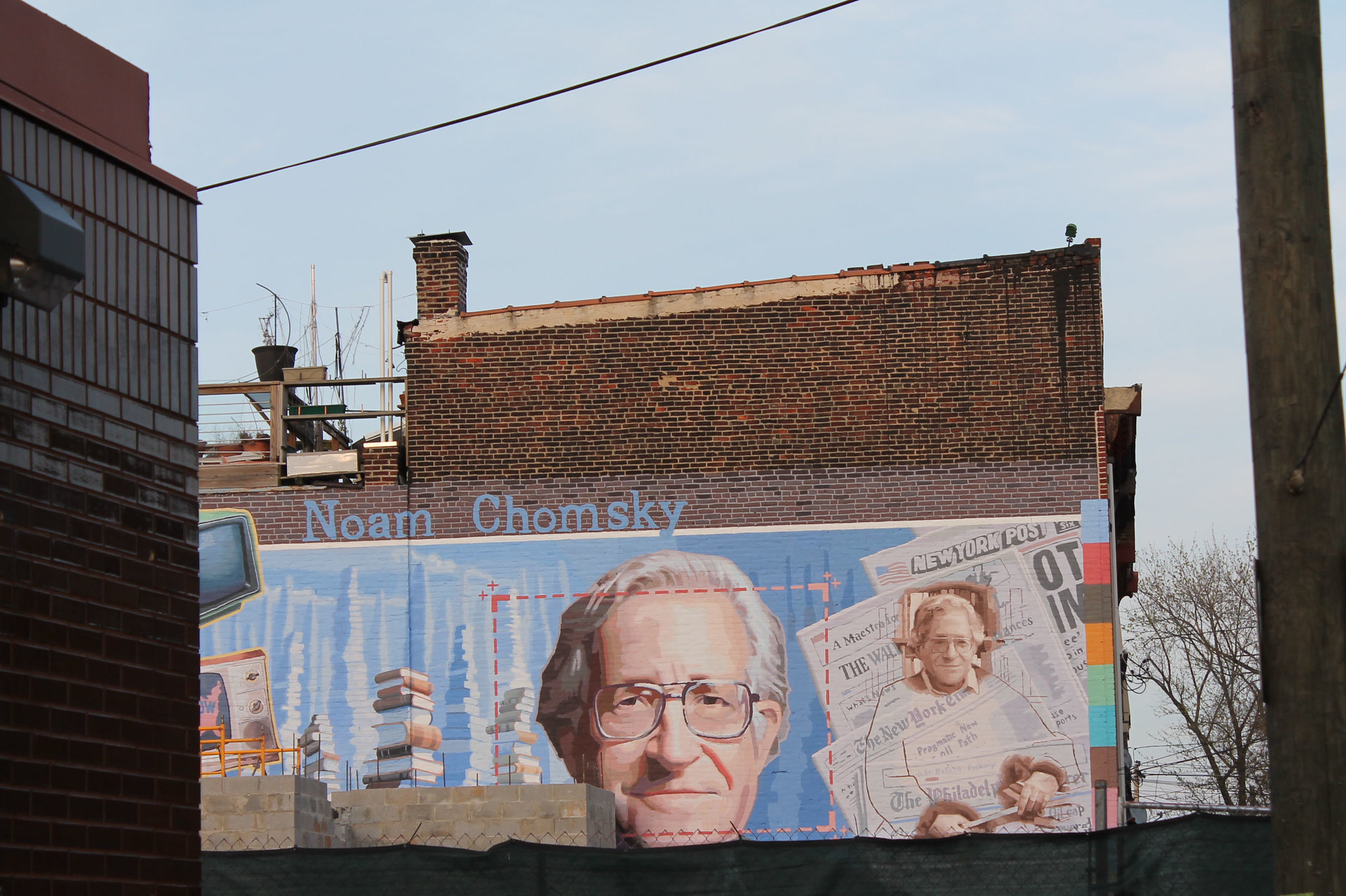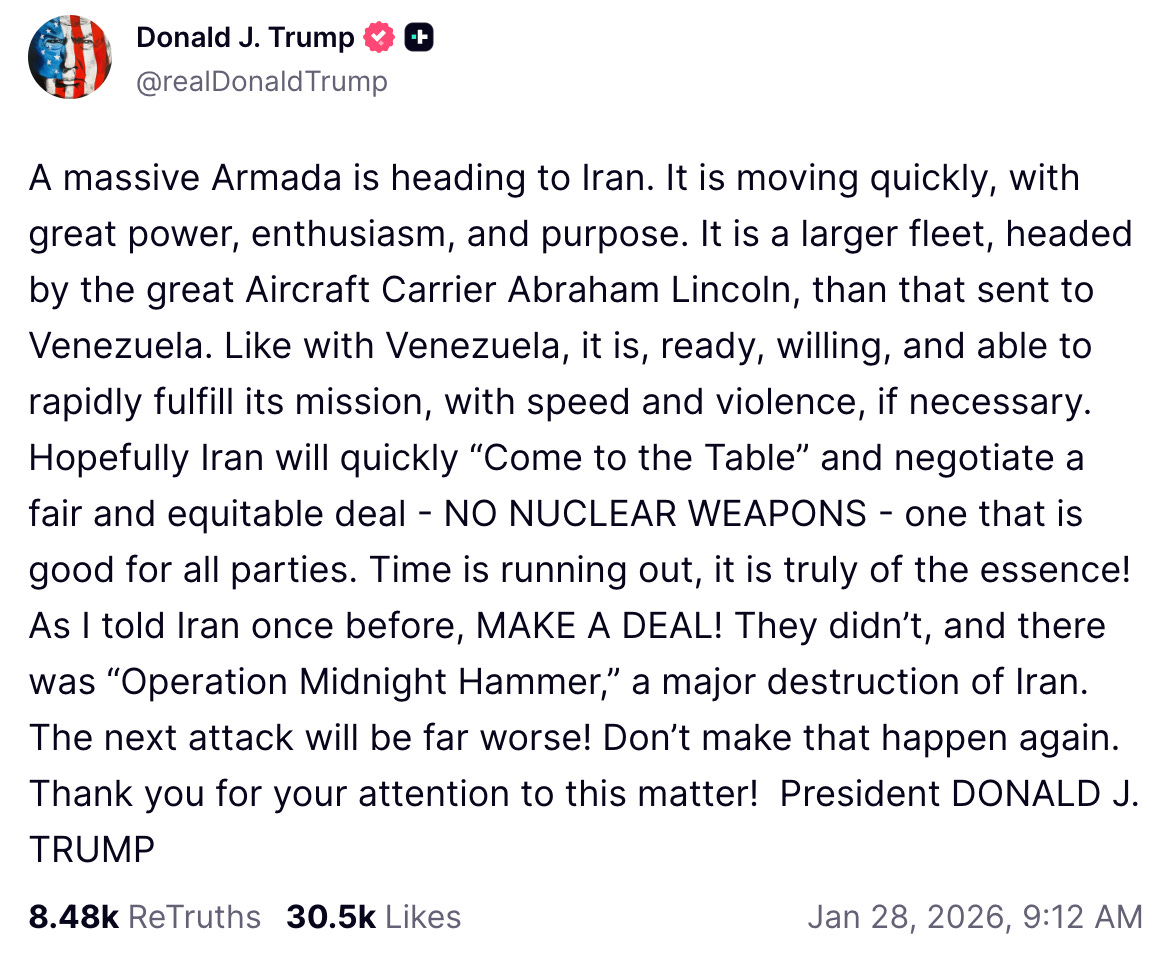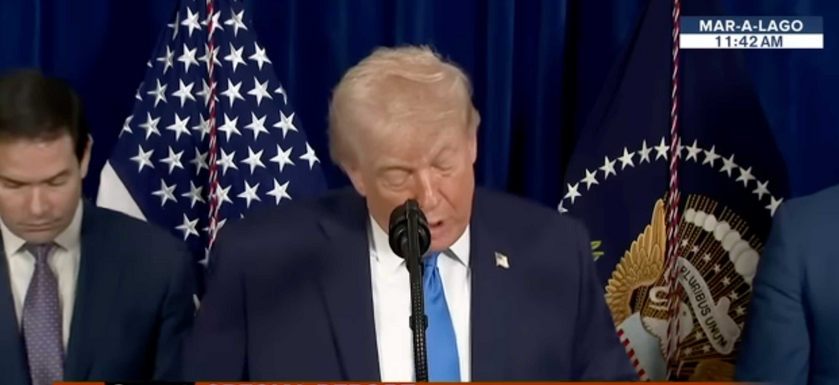
When Hillary Clinton's divine entitlement to the U.S. presidency began to look imperiled in 2016 — first due to the irreverent and unkempt (but surprisingly formidable) Democratic Party primary challenge from Bernie Sanders, the independent socialist Senator from Vermont — her campaign and its media allies invented and unveiled a deeply moving morality tale. A faceless horde of unnamed, uncredentialed, unmannered, violent, abusive and deeply misogynistic online Sanders supporters — dubbed with the gender-emphasizing name "Bernie Bros” even though many were women — were berating, insulting and brutalizing Hillary, her top campaign surrogates (U.S. Senators, former cabinet members, corporate executives), and especially pro-Hillary corporate journalists with a vast artillery of traumatizing words and violent tweets.
This storyline — and especially the way it cleverly inverted the David v. Goliath framework of the 2016 campaign so that it was now Hillary and her band of monied and Ivy-League-educated political and media elites who werethe real victims— was irresistible to Harvard-and-Yale-trained journalists at NBC, CNN,The New York Times and Washington Post op-ed pages who really believe they are the truly marginalized peoples. This narrative scheme enabled them — the most powerful and influential media and political elites in the world, with access to the most potent platforms and megaphones — to somehow credibly lay claim to that most valued of all currencies in American political life: victimhood.
With this power matrix in place, what mattered was no longer the pain and anger of people whose towns had their industries stripped by the Clintons’ NAFTA robbery, or who worked at low-wage jobs with no benefits due to the 2008 financial crisis caused by Clintonite finance geniuses, or who were drowning in student debt with no job prospects after that crisis, or who suffered from PTSD, drug and alcohol addiction and shabby to no health care after fighting in the Clintons’ wars. Now, such ordinary people were not the victims but the perpetrators. Their anger toward elites was not valid or righteous but dangerous, abusive and toxic. The real victims were multi-millionaire hosts of MSNBC programs and U.S. Senators and New York Times columnists who were abused and brutalized by those people's angry tweets for the crime of supporting a pioneer and avatar for marginalized people: the Wellesley-and-Yale-Law-graduate, former First Lady, Senator from New York, and U.S. Secretary of State Hillary Clinton.

The genius of the Bernie Bro rhetorical scheme was two-fold. First, it prioritized and centered elite discomfort over the far more important and real anger and deprivation of ordinary people. Secondly, and even better from the perspective of elite interests, it implicitly imposed a ban on any meaningful critiques of powerful political and media elites by insisting that the online abuse and resultant trauma they endured was the fault of those who criticized them. According to this elite-protecting script, this crisis of online abuse and trauma did not materialize out of nowhere. It was triggered by and was the fault of, anyone who voiced criticism of those elites. By speaking ill of these media and political figures, such critics were "targeting” them and signaling that they should be attacked.
Thus, the only way to be a responsible and respectful member of society was to refrain from criticizing Hillary and her media allies. As I wrote in January 2016 when the "Bernie Bro” manipulation was first unleashed as the Democratic primary voting cycle began:
The concoction of the “Bernie Bro” narrative by pro-Clinton journalistshas been apotentpolitical tactic— anda journalistic disgrace. It’s intendedto imply two equally false claims: (1) a refusalto march enthusiastically behind the Wall Street-enriched, multiple-war-advocating, despot-embracing Hillary Clinton is explainable not by ideology or political conviction, but largely if not exclusively by sexism: demonstrated by the fact that men, not women, support Sanders (his supporters are “bros”); and (2) Sanders supporters are uniquely abusive and misogynistic in their online behavior. Needless to say, a crucial tactical prong of this innuendois that any attempt to refute itis itself proof of insensitivity to sexism if not sexism itself (as the accusatory reactions to this article will instantly illustrate)….
But truth doesn’t matter here — at all. Instead, the goal is to inherently delegitimize all critics of Hillary Clintonby accusing them of, or at least associating them with, sexism,thusdistracting attention away from Clinton’s policy views, funding, and political history and directing it towardthe online behavior of anonymous, random, isolated people on the internet claiming to be Sanders supporters. It’s an effective weapon when wielded by Clinton operatives.
Thanks in part to Sanders himself — who repeatedly gave fuel to this storyline by apologizing for his supporters’ supposedly unique misconduct and chiding them for bad behavior, rather than mocking the inherently moronic idea that Sanders supporters were somehow uniquely abusive in their online conduct — this spectacle was a smashing success. Thereafter, it was thus repurposed against any and all movements dedicated to challenging establishment power. Each time, the real victims — the ones who merited your sympathy, compassion and protection — were somehow the very political and media elites who wield the greatest power and enjoy the deepest wealth and privilege.
Thus was the exact same narrative used to delegitimize anti-establishment critics on both the left and right: it was the go-to attack by Oxford-and-Cambridge-educated journalists and Blairite Labour MPs against online supporters of interloper Jeremy Corbyn and was then deployed in all realms against supporters of Donald Trump, all of whom were depicted as menacing threats to the most sacred, successful and manicured elites of U.S. and British high society.
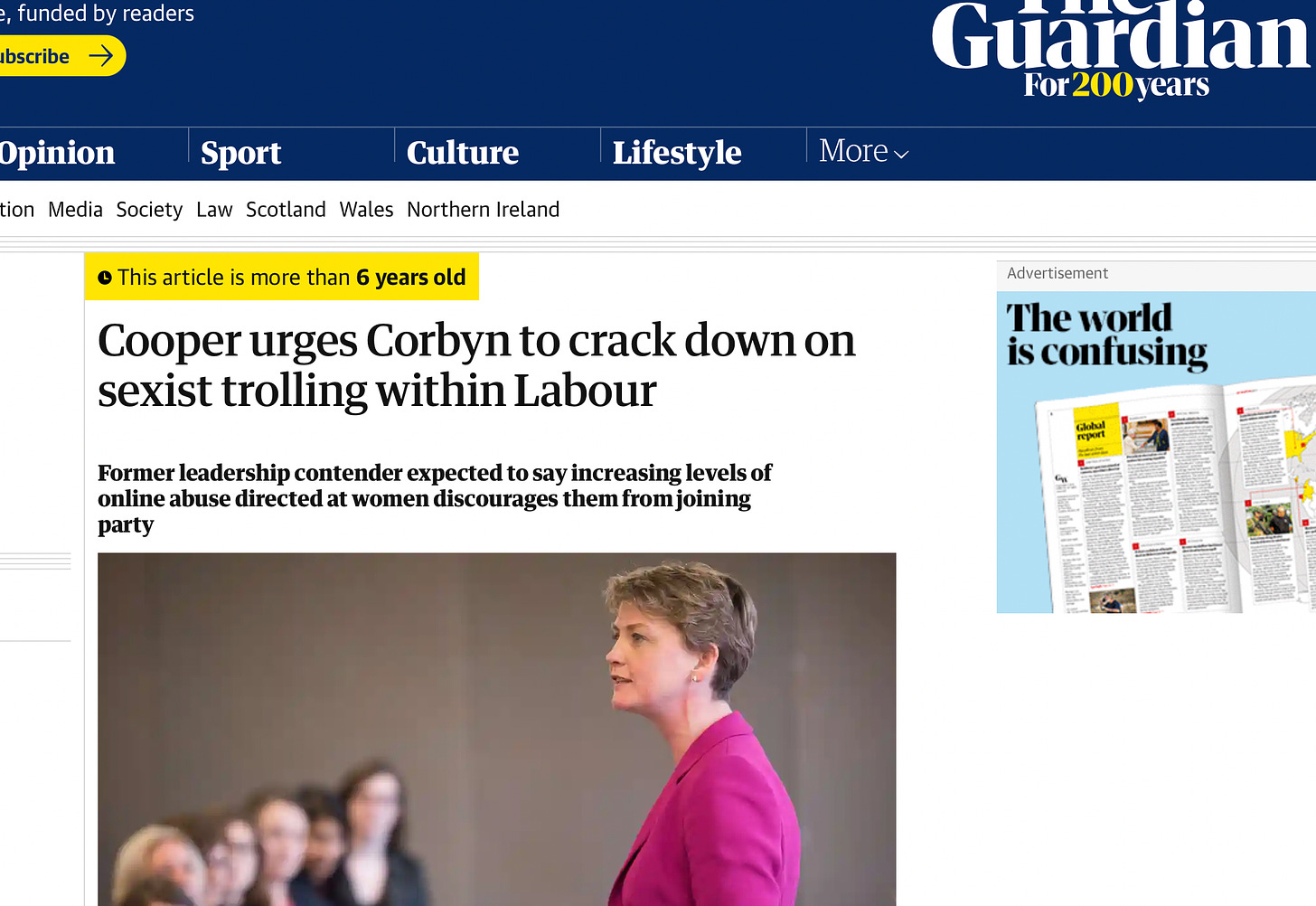
During Sanders’ second campaign run in 2020, the abuse-victim role of Hillary Clinton was played by her understudy Sen. Elizabeth Warren of Harvard Law School. When Warren's corpse of a campaign could no longer be propped up by millions of dollars in dark money from Silicon Valley oligarch Karla Jurvetson, the Massachusetts Senator dropped out and was immediately interviewed by MSNBC's Rachel Maddow— of Stanford University and the Rhodes Scholar program of Oxford — for eight straight minutes about the trauma and abuse Warren suffered at the hands of unnamed Sanders supporters, whose grave crimes were the use of a snake emoji and other online insults to brutalize Warren and her band of Ivy-League East Coast supporters. The DNC organ Vox— through its writer Zack Beauchamp of the Georgetown Day School, Brown University and the London School of Economics —promptly sermonized that continued irreverence and a lack of decorum on the part of the nation's unwashed to our country's most prestigious political and media elites will "backfire” against the hordes of online abusers and those who lead them:
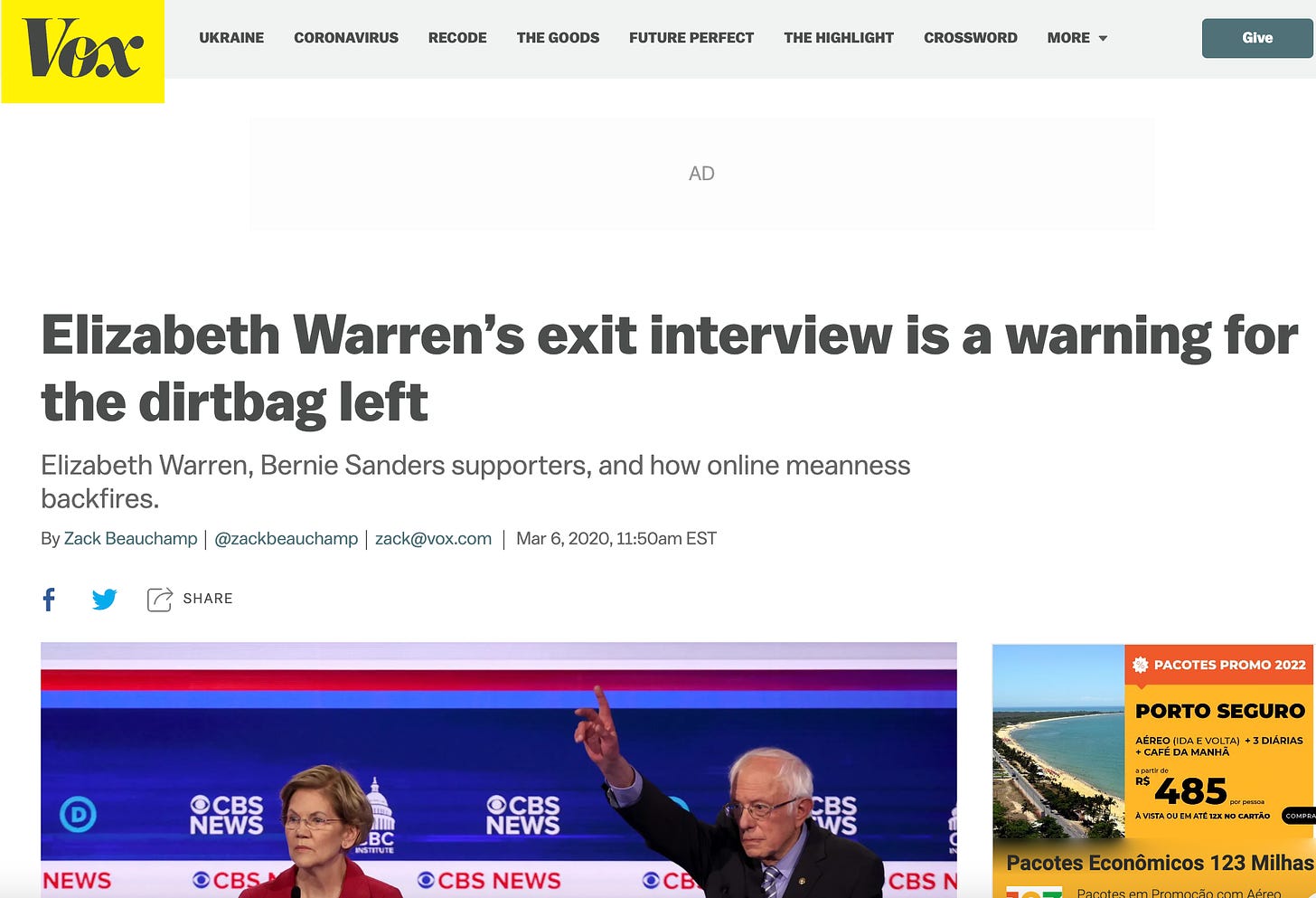
We have now endured almost a full decade of elites from the most prestigious schools, who work inside the most powerful media corporations, lecturing everyone that they are in fact the real victims, and that the most pressing national crisis is the ways they are criticized.
Even when one marvels, as one must, at all these impressive displays of cynical elite emotional manipulation and self-victimization, there is absolutely nobody who exploits it better than Taylor Lorenz. Raised in Old Greenwich, Connecticut, educated at Greenwich High School and lovely private boarding schools in the Swiss Alps, then graduating from the leafy private liberal arts Hobart and William Smith Colleges in bucolic upstate New York, Lorenz developed an intense and unyielding obsession with TikTok teenagers and their TikTok houses. This interest in the lives of online teenage culture was cultivated as she approached middle age, and she parlayed this unique interest into stints as a star front-page reporter with the two most powerful newspapers in the U.S.: The New York Times, which she quit two months ago, and The Washington Post, where she is now a star columnist.
It is almost impossible to envision a single individual in whom power, privilege, and elite prerogative reside more abundantly than Taylor Lorenz. Using the metrics of elite liberal culture, the word “privilege” was practically invented for her: a rich straight white woman from a wealthy family raised in Greenwich, Connecticut and educated in actual Swiss boarding schools who now writes about people's lives, often casually destroying those lives, on the front pages of the most powerful East Coast newspapers on the planet. And yet, in the eyes of her fellow media and political elites, there is virtually no person more victimized, more deserving of your sympathy and attention, more vulnerable, marginalized, and abused than she.
That is because — like Hillary Clinton and Elizabeth Warren and Labour MPs and columnists fromThe Independent andThe Guardian and The New York Times who pioneered these paths of elite victimhood before her — Taylor Lorenz must sometimes hear criticisms of her work and her views. Virtually alone among journalists — who are famously universally beloved and never subjected to any form of real abuse: as Julian Assange will be happy to tell you if you can visit him in his high-security prison cell in the UK, or as these Sri Lankan journalists will explain from their hospital beds after being physically brutalized by the police for covering an anti-government protest on Thursday — Lorenz hears criticisms of her work, sometimes in the form of very angry and even profane or threatening tweets from anonymous people online. This not only means that she deserves your sympathy and concern but, more importantly, that you should heap scorn and recrimination on those who criticize her work because they are responsible for the trauma she endures. Most of all, you must never criticize her publicly for fear of what you might unleash against her.
In other words, Lorenz — like all employees of large media corporations or powerful establishment politicians in Washington and London — is and always should be completely free to continue to publish articles or social media posts that destroy the reputations of powerless people, often with outright lies. But you must never criticize her because she suffers from PTSD and other trauma as a result of the mean tweets that are unleashed by her critics. If you believe that is some sort of straw man exaggeration of what political and media elites are trying to do — create a shield of immunity around them while they retain the right to target, attack, insult, malign and destroy anyone they want — then it means you did not see the Emmy-worthy performances of Lorenz and various NBC News personalities on Friday afternoon during their five-minute segment on Chuck Todd's Meet the Press Daily designed to fortify this warped, inverted standard of morality and power.
The NBC segment was ostensibly designed to "cover” a “study” from January published by the Brookings Institutions and conducted by "NYU’s Center for Social Media and Politics and the International Women’s Media Foundation.” This study purported to forensically analyze — and I am not joking — the increase in criticisms of Taylor Lorenz as the result of a tweet I posted criticizing her (re-cast in elite parlance as “attacking” and "targeting” her), as well as a television segment that aired on Tucker Carlson's Fox program that also criticized the NYT reporter. You will never guess what the study revealed: namely, our criticism of her was responsible for a torrent of violent abuse, misogynistic rage, and traumatizing brutality against the corporate journalist:
Our analysis used large-scale quantitative data to assess how the public conversation surrounding these journalists changed in the aftermath of being targeted by prominent media personalities. The research findings showed sharp increases in harmful speech after the journalists were targeted by Carlson and Greenwald….After Carlson targeted Lorenz in a segment on his Fox News show, we found that one in two tweets mentioning Lorenz contained either toxic or insulting language….In Figure 2, we plot the 24-hour moving average of tweets before and after Greenwald targeted Lorenz. The figure shows that after Greenwald’s attack, the likelihood that tweets mentioning Lorenz would contain harmful speech increased by 144%, peaking on Aug. 15, 2021, two days after he targeted Lorenz.
Now, permit me to pause to acknowledge an important concession. The three academic scholars who are the authors of this groundbreaking study on online abuse of powerful elites are absolute experts in marginalization, victimhood, and abuse. They have the lived experience of it. Indeed, nobody has suffered worse deprivations than they, so one should be extremely deferential in treating their pronouncements with the respect they deserve. Zeve Sanderson is a graduate of Brown University and the Masters’ Program of New York University and is now the Founding Executive Director at the NYU Center for Social Media and Politics. The other two have degrees from New York University and George Washington University and are also now employed studying “online extremism” at NYU, one of the country's most expensive private universities residing in the heart of Manhattan. So they clearly know marginalization and victimhood when they see it.
The on-screen title of the NBC segment was “1 in 3 Women Under 35 Experience Online Attacks.” This was an extremely odd title since they interviewed two journalists who recounted their online trauma, neither of whom fall into that category. Though Lorenz is often infantilized by her media supporters as some teenager or very young adult — a natural assumption, I suppose, given her obsession with teenaged TikTok houses and other adolescent online paraphernalia — in fact her age is expressed at anywhere in the range from 36 to 43 years old depending on her mood of the day.
The other featured journalist alongside her was Kate Sosin, who does not identify as a woman at all but rather “a proud trans person” who uses the pronouns “they/them"; by referring to Sosin repeatedly as a woman and using the pronouns “she” and “her” to reference their work, NBC repeatedly misgendered the journalist. Anyway, one would think, or at least hope, that if NBC is going to broadcast a report on “women under the age of 35 [who] have experienced harassment online,” they could find journalists who actually fall into that group and not misgender a journalist who is already complaining about abuse and trauma.
The NBC segment has to be watched in its entirety to be believed. Though the emotional performances are moving and spectacular — no denying that — it is important not to let your tears drown out the actual point they are making. It is a quite sinister and insidious lesson they are preaching. When powerful media elites receive mean and abusive tweets from anonymous and random people on Twitter, it is not the fault of those sending those tweets but rather the fault of anyone criticizing their work and their journalism. The only moral conclusion is clear: one should refrain from criticizing employees of media corporations lest one be responsible for unleashing traumatizing abuse at them. Marvel at this performative elite victimhood by all the actors involved:
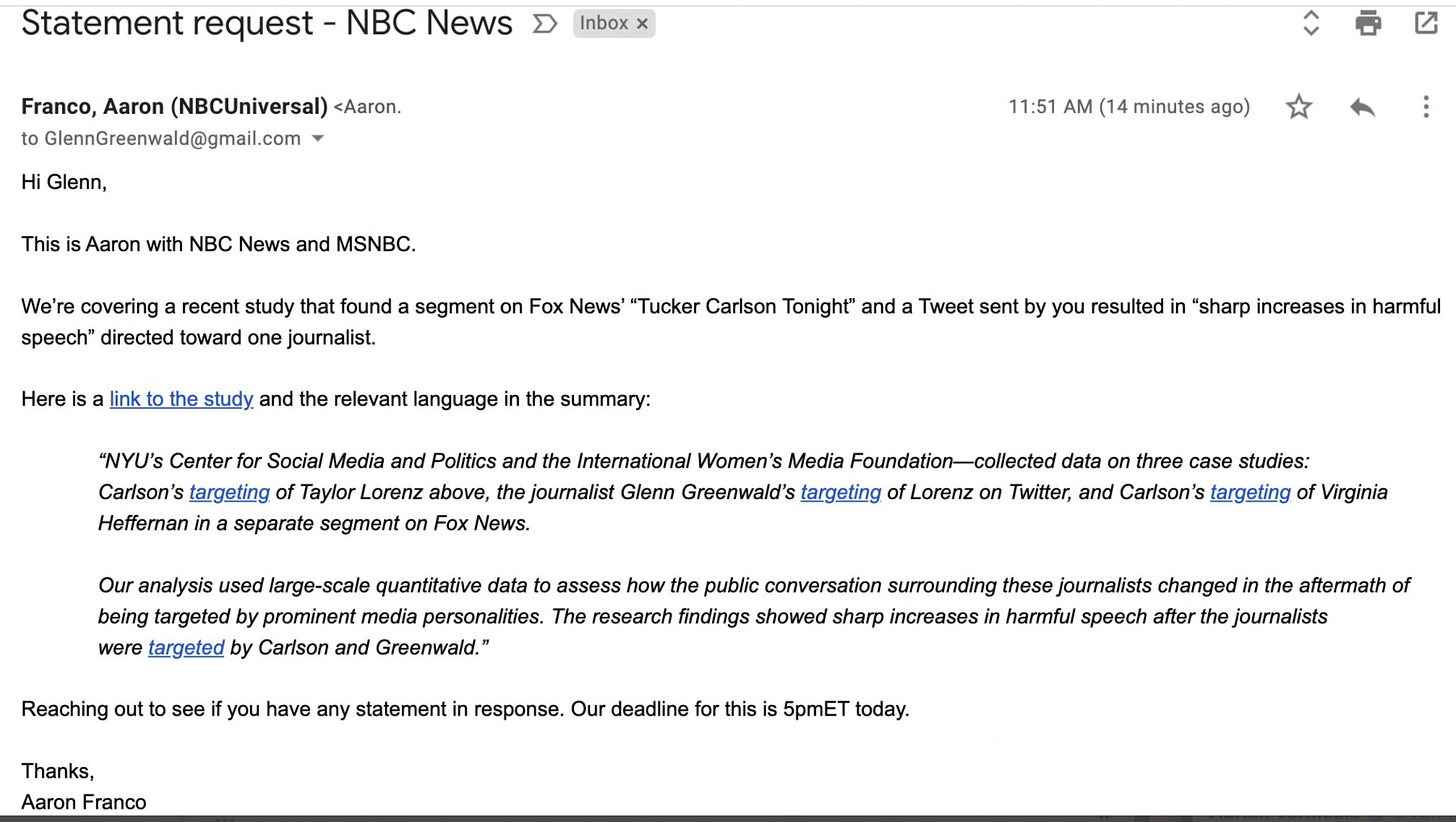
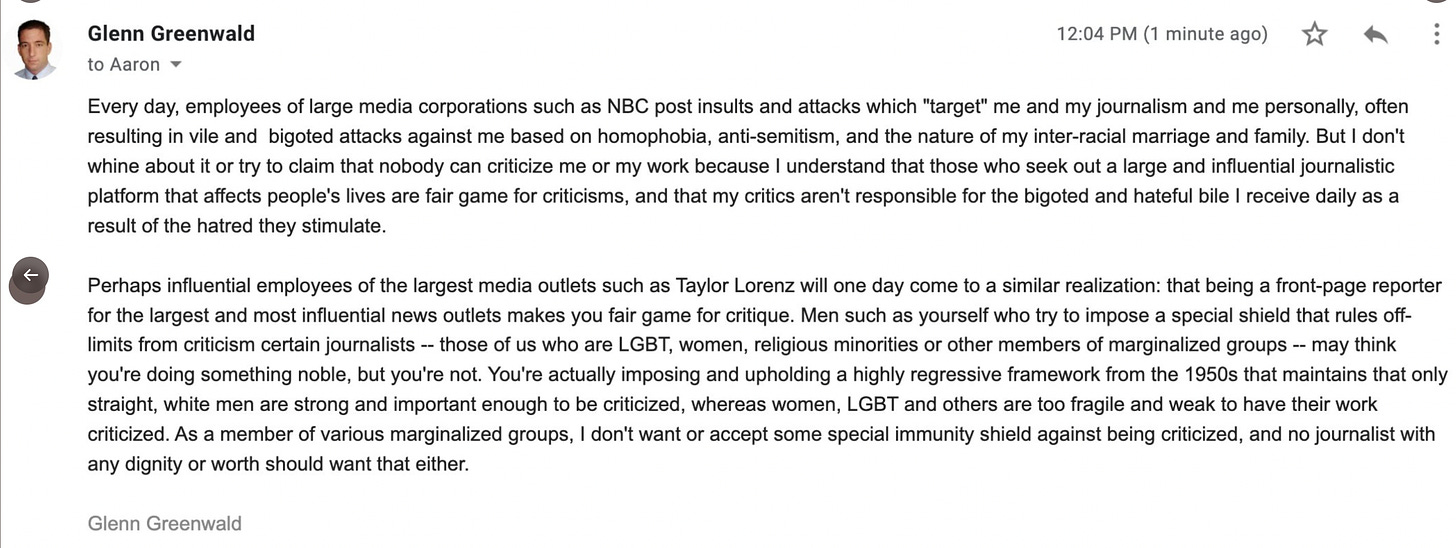
It cannot be overstated how often and casually corporate media employees like this destroy people's lives. They confront old women on their Florida front lawn for having promoted a pro-Trump event on Facebook that was supposedly organized by Russians. They threaten to expose their critics unless they promise to cease voicing critiques. They dox workers or the crime of producing videos that mock the richest and most powerful politicians in the country such as House Speaker Nancy Pelosi.
And Lorenz has left behind a long list of victims — from teenagers whose old tweets and family history she dug up and published to a business woman whose life she destroyed to journalists and others about whom she maliciously lied. She was one of the media leaders mocking and shaming a college student for having published an op-ed in The New York Times on how intolerance for dissent from liberal pieties on college campuses has made her afraid to speak out. She's the vintage mean girl. So malignant and deceitful and destructive are Lorenz's shoddy journalistic methods that it took more than an hour for this investigative reporter to document in this great YouTube video all the lies and destruction Lorenz has left in her wake.
Yet look at what NBC just did. While flamboyantly displaying his newly minted credential as a Great Male Ally, Meet the Press host Chuck Todd ended the segment with this sermon: “folks who live online know exactly what they're doing when they target a journalist.” Do Todd and his fellow weeping actors not realize that they just spent five minutes doing exactly that: targeting journalists by blaming us for the trauma and suicidal ideation of the weeping Washington Post columnist? Why is it permissible for employees of NBC and The Washington Post and the rest to constantly use their platform to malign and demonize journalists, but we cannot criticize them without being accused of unleashing misogynistic violence?
And what about all of Lorenz's victims? Why do their trauma and the wreckage of their lives from her reports not matter? The answer is obvious. What elites have succeeded in training people to believe is that, somehow, what matters most is the emotional comfort of the society's most powerful and influential political and media figures. They have the unfettered right to demean and denounce and vilify whomever they want, no matter how powerless, but you cannot speak up or object when they do just that.
All of this is psychological training to not only accept but be grateful for the unique privileges demanded by the most powerful people in society. As the former-Obama-campaign-operative-turned-incisive-social-commentator Shant Mesrobian put it: “The point of this is to silence certain modes of political speech by characterizing it as harassment and deploying groups of supposedly marginalized and oppressed people who aren't at all marginalized or oppressed but are in fact elite enforcers of a dominant political regime.”
I can guarantee you that there is no form of online abuse that Lorenz has received that I have not received. That is true of most journalists. In case anyone doubts that you can read a nice sampling below of three emails I received after Lorenz and various NBC on-air personalities “targeted” me (meaning: criticized me). In 2020, The New York Times detailed the very serious, specific and pervasive death threats aimed at me as the result of the investigative exposés I published in Brazil and the work of my husband in the Brazilian Congress; the death threats were so continuous and credible that we were required to install teams of armed guards at our home and to never leave the house without their accompaniment. And that's to say nothing of the actual forms of real persecution my journalism has provoked, not from random liberal Twitter users — who every day call me a traitor, a Kremlin agent, a pedophile, and everything else — but from the most powerful governments on earth.

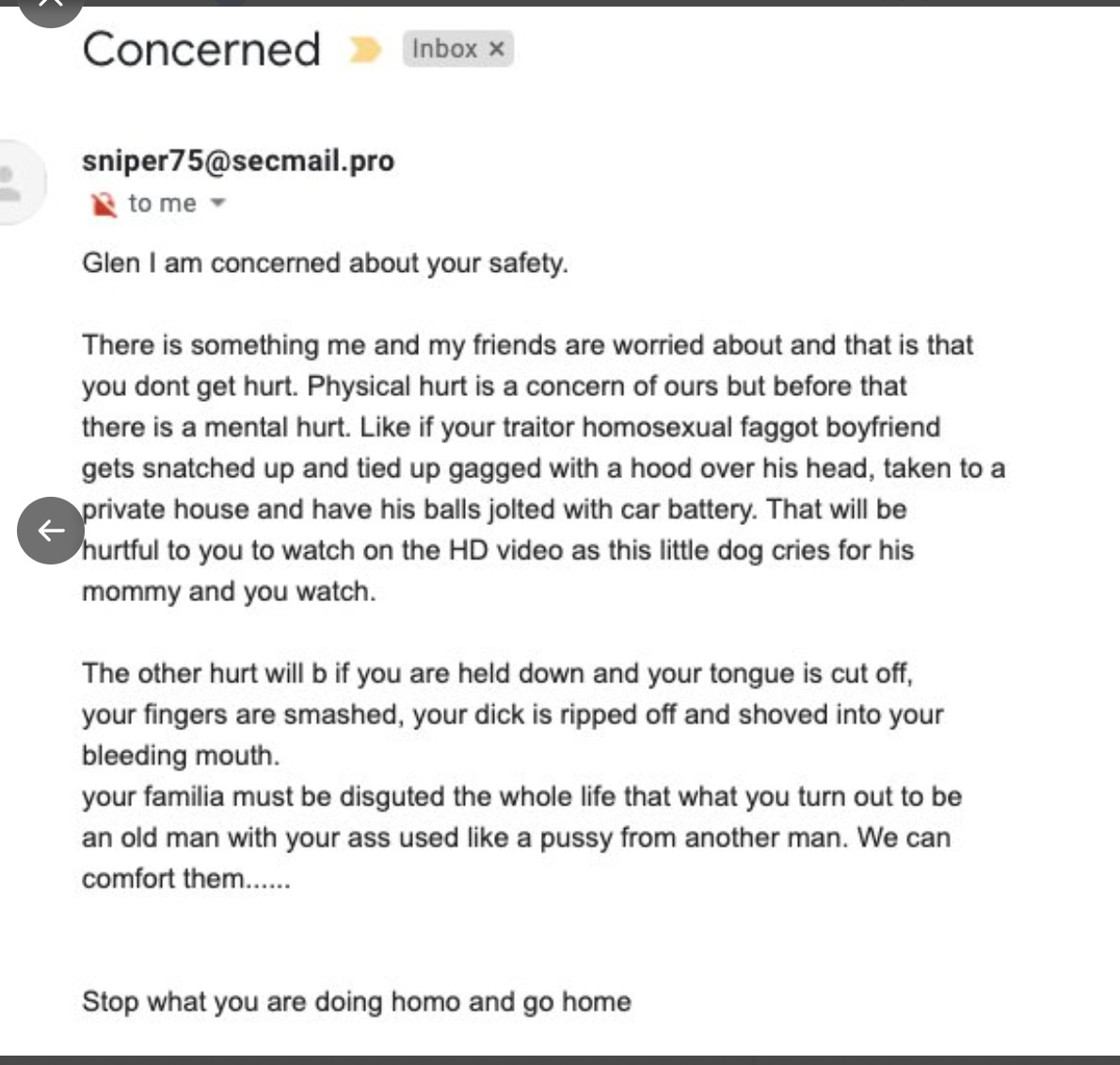

I could fill a book with those. I do not need lectures from anyone on online bigoted abuse. If I were going to invoke the same standard which NBC and Lorenz and their corporate media allies want to impose on everyone else, I would demand that they accept responsibility for this torrent of abuse, threats, bigoted hatred, etc. that I receive every day for doing my job as a journalist. I could weep on camera about what Taylor Lorenz has done to me — including publicly stating that I am not a “legitimate journalist”: the exact claims used by the U.S. and Brazilian governments to justify my prosecution for my reporting. That happened to be the tweet of hers that provoked my response which then became the subject of a "study” of online abuse by Brookings, NYU and NBC News.
Indeed, if I were using their manipulative, self-victimizing jargon, I would insist that Chuck Todd committed a horrible moral crime by devoting five minutes of some of the most influential airtime on television to depicting an LGBT Jewish journalist with an inter-racial marriage and family of having brutalized a woman. I would hold up every mean tweet and email I've received over the last twenty-four hours as proof of the abuse unleashed by this white, straight, multi-millionaire male host of a major news corporation.
But since I am a functioning adult, and realize that I have purposely sought out a public platform that can affect and influence the society around me and people's lives, I recognize that I am fair game for criticism, even harsh criticism, and have no desire to shield myself from criticism by exploiting my emotions from reading and hearing things like that. At some point, the richest and most powerful employees of media corporations should come to the same realization.
In part, all of this comes from the fact that most corporate journalists and their junior varsity cousins — the coddled Brooklyn-based digital media culture — never meaningfully challenge anyone in real power or thus provoke their anger. They have never experienced and will never confront actual journalistic persecution such as threats of imprisonment, actual criminal indictments for one's reporting, officially-sanctioned threats of violence, or violence itself. What stories has Chuck Todd or Taylor Lorenz ever broken to warrant the attention of any power center, let alone their sustained hatred? At most, Lorenz has probably angered several teenagers on TikTok while Chuck Todd does not even do that. Thus, the worst they have ever faced for their trivial, power-serving gossip masquerading as “reporting” are mean tweets, so of course they want to elevate those as the gravest moral crime, as the height of trauma. Only then can they center themselves and feel important.
But beyond the infantile psychological neediness on display, most of this is about something much more serious and substantive: namely, preserving and fortifying the caste system that has placed them at the top. Ever since they were rewarded with admission into elite universities or plumb prestigious jobs at the nation's most influential media corporations, they really have been told, and have come to believe, that they are entitled totheir superior and elite status. They are the winners, the rulers, the opinion-makers. And that of course means that they have the right — the natural right — to say anything about you, to malign or smear you in any way they want, while you must not object in any way, and certainly not in any way that is irreverent or disrespectful, because doing so constitutes “harassment” and abuse and bullying of them.
Somehow, the bullies have converted themselves into the bullied. Your deepest concern and compassion must be directed to the richest, most powerful, and most privileged members of society.
The only valid response to all of this is derision and contempt. I don't mean derision for Lorenz's weeping. It is entirely possible that, among powerful media elites, she has a unique inability to endure public criticism. It is of course likely that her suffering is real. What deserves contempt and scorn — the deepest and most visceral rejection — is the accompanying framework elites are attempting to erect on the back of her performative emotional instability. It is the claim that political and media elites can never be publicly criticized for how they wield their immense and often destructive power because such criticism may subject them to mean tweets. Ignore that, mock it, spew contempt at it and, most importantly of all: continue to criticize powerful elites with gusto and freedom.
To support the independent journalism we are doing here, please subscribe, obtain a gift subscription for others and/or share the article:



